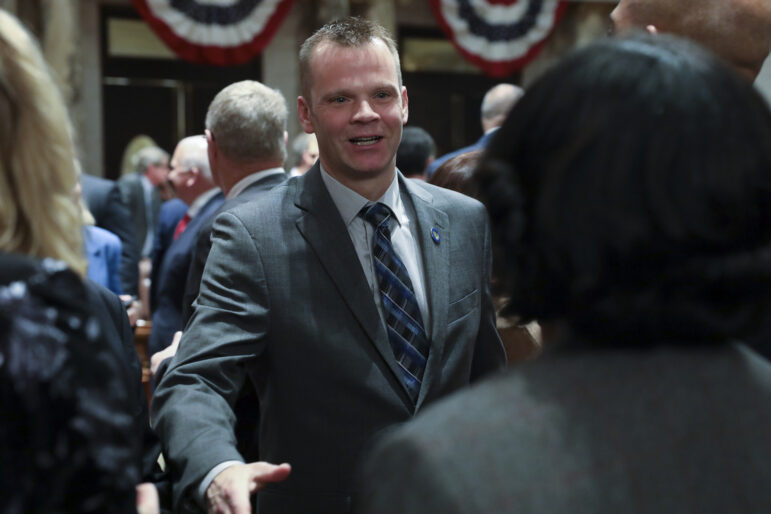Tax Cut Has Democrats Playing Defense
Republican proposed tax cut is huge, historic. But benefits skew toward the wealthy.
Republican legislators have put Democratic Gov. Tony Evers and Democratic lawmakers up for re-election next year in a position where voters may ask them, “Why did you veto, or vote against, a $3.4-billion tax cut?”
Republican leaders added what could be a popular tax cut to the Joint Finance Committee (JFC) version of 2021-23 state budget, although it may be tweaked as the Assembly and Senate debate it this week. Republicans control both houses of the Legislature.
And, once the Republican spending plan is on his desk, Evers will have to consider whether to veto it entirely or rework it with vetoes — decisions with major implications for the governor’s re-election campaign next year.
The Republicans’ tax cut checks lots of political boxes in the final stages of the Legislature’s budget process. It also spends $3.7 billion less than the $91-billion budget Evers recommended in February, according to the nonpartisan Legislative Fiscal Bureau (LFB). Republicans say the tax cut is justified because state government is projected to collect $4.4 billion more in taxes by mid-2003 than expected — a one-time windfall.
Political boxes the GOP tax cut checks include:
-Income tax cuts for middle-class and highest-earning taxpayers: Most Wisconsin taxpayers are in the tax bracket that Republicans want to cut by 15% – from 6.27% to 5.3%, effective this year. LFB reports that the cut would save taxpayers $2.6 billion over the next two years, or an average of $598 per taxpayer.
The JFC budget also includes $9.8 million in new tax credits for children and dependents, which would be tied to a new federal tax break.
LFB’s analysis of the first year of the combined tax cuts, however, found the cuts benefit higher income taxpayers more: Taxpayers with adjustable gross incomes (AGIs) of up to $100,000 would get 26% of the tax cuts, although they make up 67% of all taxpayers. Taxpayers with AGIs of between $100,000 and $200,000 would get 41% of the tax cuts, although they are 25% of all taxpayers. And, taxpayers with AGIs above $200,000 would get 33% of the tax cuts, although they make up 8% of all taxpayers.
-Tax cut for businesses: The GOP budget includes $202 million that would forgive personal property taxes scheduled to be paid this year by businesses on their inventories, office equipment and other items. The $202 million would continue a phaseout of the personal property tax begun in 2017.
Republican legislators are also moving a separate bill repealing the personal property tax, starting in January.
-Property tax cut on homes: The Republicans’ budget continues spending caps on schools and local governments but includes $647 million in new state aid to cut property taxes statewide. A Fiscal Bureau report Friday said the JFC budget would cut the property tax bill on the median-valued Wisconsin home by $101, or 3%. The Fiscal Bureau memo said that home, which is now assessed at $205,600, had an after-credits property tax bill of $3,315 last December.
Estimates of tax bills for average-valued homes are deceiving, however, because so many referendums have been passed by local school districts.
-Income tax cut for active-duty service members: The two-year GOP budget includes $40 million to reduce state income taxes owed by those in the military on active duty.
-Boost surplus: Republicans also plan to put $200 million more in the Budget Stabilization – or “rainy day” – Fund, potentially increasing its mid-2023 balance to a healthy $2.1 billion.
“It’s your money and we will be passing a budget that sends much of it back to the people and businesses,” added Assembly Speaker Robin Vos. “We were able to reach the goal of two-thirds funding for our K-12 schools.”
Democrats don’t sound boxed in, however. Democratic Sen. LaTonya Johnson of Milwaukee offered this take: Republicans are wasting “the biggest opportunity that we have … to invest in our state, in our kids, and in their precious futures.”
Steven Walters has covered the Capitol since 1988. Contact him at stevenscotwalters@gmail.com
If you think stories like this are important, become a member of Urban Milwaukee and help support real, independent journalism. Plus you get some cool added benefits.
More about the 2021-2023 Wisconsin Budget
- Americans for Prosperity Launches Robust Grassroots Thank You Campaign for Legislators’ Leadership Amid Major Budget Battle - AFP Wisconsin - Jul 26th, 2021
- ‘Governor Wins’ on State Budget? - Laurel White - Jul 13th, 2021
- Evers Offers GOP a Second Chance to Fund Schools - Ruth Conniff - Jul 11th, 2021
- Evers Tinkers With Tax Cut - Erik Gunn - Jul 10th, 2021
- Bipartisan Efforts Honor AmeriCorps Members’ Service by Exempting the Segal Education Award from State Income Tax - Serve Wisconsin - Jul 9th, 2021
- AARP WI frustrated but optimistic that budget proposals helping those 50-plus will be addressed by separate legislation this fall - AARP Wisconsin - Jul 9th, 2021
- Sen. Larson Statement on Gov. Evers’ Partial Budget Veto - State Sen. Chris Larson - Jul 8th, 2021
- Republicans on JFC Reject Governor Evers’ Healthy Women, Healthy Babies Proposal in State Budget in Advance of Vote in Assembly - Planned Parenthood Advocates of Wisconsin - Jun 29th, 2021
- The State of Politics: Tax Cut Has Democrats Playing Defense - Steven Walters - Jun 28th, 2021
- School Officials, Families Blast GOP Budget - Madeline Fox - Jun 22nd, 2021
Read more about 2021-2023 Wisconsin Budget here
The State of Politics
-
RNC Brings Fame to Gen Z Party Leader
 Jul 15th, 2024 by Steven Walters
Jul 15th, 2024 by Steven Walters
-
Wisconsin’s Republican Roots Run Deep
 Jul 8th, 2024 by Steven Walters
Jul 8th, 2024 by Steven Walters
-
Feuding Supreme Court Justices Need a Break
 Jul 1st, 2024 by Steven Walters
Jul 1st, 2024 by Steven Walters






















